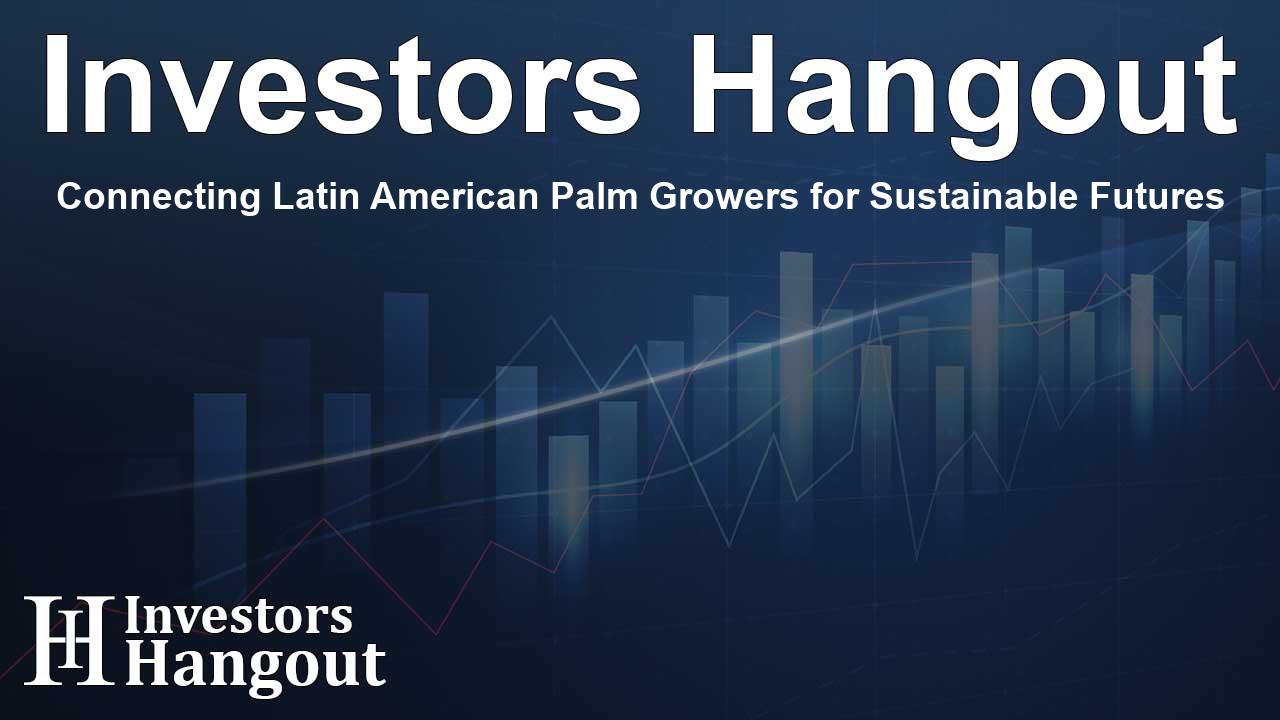Connecting Latin American Palm Growers for Sustainable Futures

Empowering Sustainable Practices Through Collaboration
Sustainable practices are increasingly becoming a focal point in agricultural sectors globally. Recently, representatives from prominent consumer goods companies undertook a significant journey into Peru's Ucayali region as part of a well-orchestrated initiative by the Roundtable on Sustainable Palm Oil (RSPO). Major players such as Hershey's, The J.M. Smucker Company, and Natura visited to explore sustainable palm oil practices and engage with local producers, enhancing the connection between local growers and international buyers.
The Importance of Local Partnerships
This immersive tour was pivotal in showcasing the committed local actors involved in Peru's sustainable palm oil sector. From the Association of Palm Growers of Monte Alegre (APROMAN) to Oleaginosas Amazónicas S.A. (OLAMSA), these organizations exemplify how independent smallholders play a crucial role in promoting sustainability. The tour provided not just an insight into production methodologies but emphasized the collective efforts made by these local actors to ensure environmental and economic viability.
A Model for Latin America
Through RSPO, participants gained firsthand experience of the sustainable palm oil production model, a progressive benchmark for other regions. Experts from RSPO and Solidaridad Network led participants through significant sites, including organic farms and value-added product companies. This exposure illustrated how smallholders in Peru and beyond are transforming their agricultural practices.
Learning from Each Other
Beyond showcasing successful models, the tour fostered valuable dialogues among sustainability representatives from various companies. Pedro Seijas Cárdenas, the Technical Manager of APROMAN, highlighted the vital role of collaborative strategies in enabling producers to enhance their sustainability commitments. This synergy illustrates how supporting smallholders creates a foundation for robust and resilient communities.
Realizing the Value Chain
Erika Meschkat, the Associate Manager of Sustainability at JM Smucker, expressed the profound impact of engaging directly with producers. Such interactions bridge the gap between raw material sources and consumer markets, rendering the value chain more transparent. Participants noted that seeing the challenges that producers face helps drive meaningful solutions.
Addressing Challenges in Sustainability
As the conversation progressed, Bella Sosa, RSPO Smallholders Regional Manager for Latin America, noted the importance of these exchanges. They allow buyers to gain insights into the challenges smallholders face, such as limited access to financial, technical, and market resources. Such understanding is essential to develop supportive frameworks that reinforce sustainable practices.
The Growing Impact of RSPO
Latin America has become a significant player in the sustainable palm oil arena, representing one of the fastest-growing regions for RSPO-certified production. With a reported 35% of its palm oil output certified, the region is reshaping global markets for responsible sourcing. Additionally, North America has seen soaring imports of RSPO-certified palm oil, covering nearly 89% of all imported palm oil.
Continuing the Mission for Sustainability
RSPO is committed to strengthening the ties between producers and buyers, which is essential for achieving broader sustainability goals. By providing platforms for interaction and awareness, RSPO continues to advocate for responsible practices within the supply chain, ensuring that both environmental stewardship and community welfare are prioritized.
About RSPO
The Roundtable on Sustainable Palm Oil (RSPO) is a global initiative established to promote sustainable palm oil production. Formed in 2004, it encompasses various stakeholders, including producers, manufacturers, retailers, and conservation organizations. By facilitating global change and promoting sustained engagement in the palm oil sector, RSPO aims to inspire responsible consumption and production practices worldwide, thus enhancing positive impacts on communities.
Frequently Asked Questions
What is the RSPO?
The RSPO stands for the Roundtable on Sustainable Palm Oil, a global initiative aimed at promoting sustainable practices in palm oil production.
Why is local engagement important?
Local engagement fosters collaboration between producers and buyers, leading to improved sustainable practices and community empowerment.
How does RSPO support smallholders?
RSPO provides resources, training, and frameworks that help smallholders adapt to sustainability standards and access international markets.
What are the benefits of sustainable palm oil?
Sustainable palm oil practices enhance environmental health, increase economic resilience for farmers, and contribute to community wellbeing.
Why is transparency in the supply chain essential?
Transparency helps consumers understand the origins of their products, fosters trust, and encourages responsible sourcing practices among buyers.
About The Author
Contact Hannah Lewis privately here. Or send an email with ATTN: Hannah Lewis as the subject to contact@investorshangout.com.
About Investors Hangout
Investors Hangout is a leading online stock forum for financial discussion and learning, offering a wide range of free tools and resources. It draws in traders of all levels, who exchange market knowledge, investigate trading tactics, and keep an eye on industry developments in real time. Featuring financial articles, stock message boards, quotes, charts, company profiles, and live news updates. Through cooperative learning and a wealth of informational resources, it helps users from novices creating their first portfolios to experts honing their techniques. Join Investors Hangout today: https://investorshangout.com/
The content of this article is based on factual, publicly available information and does not represent legal, financial, or investment advice. Investors Hangout does not offer financial advice, and the author is not a licensed financial advisor. Consult a qualified advisor before making any financial or investment decisions based on this article. This article should not be considered advice to purchase, sell, or hold any securities or other investments. If any of the material provided here is inaccurate, please contact us for corrections.
